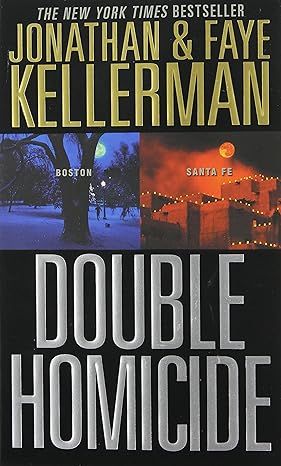Double HomicidePaperback
4.1
-
1,297 ratings
For the first time ever, bestselling novelists Jonathan and Faye Kellermen team up to deliver the launch book in a thrilling new series of short crime novels. This book--printed as a reversible volume with two different covers--contains two stories featuring different detectives solving crimes in different cities.
It’s a reader’s dream come true: a new series co-written by the royal couple of crime fiction—Jonathan and Faye Kellerman! Each book contains two novels jointly written by the duo, featuring different detectives solving crimes in different cities. “In the Land of the Giants” has Boston homicide detectives Michael MacCain and Doris Sylvestor investigating the suspicious death of a college basketball star. And in “Still Life,” the co-worker of a Santa Fe art gallery is murdered, forcing detectives Darryl Two Moons and Steve Katz to put aside holiday celebrations and set things right.
Kindle
$7.99
Available instantly
Audiobook
$0.00
with membership trial
Hardcover
$27.33
Paperback
$1.82
Ships from
Amazon.com
Payment
Secure transaction
ISBN-10
0446614122
ISBN-13
978-0446614122
Print length
304 pages
Language
English
Publisher
Grand Central Publishing
Publication date
June 30, 2005
Dimensions
4.25 x 1 x 6.75 inches
Item weight
4.8 ounces
Product details
ASIN :
B000FC2J2K
File size :
593 KB
Text-to-speech :
Enabled
Screen reader :
Supported
Enhanced typesetting :
Enabled
X-Ray :
Enabled
Word wise :
Enabled
Editorial reviews
Amazon.com Review
Two short novels by a couple who've each gone it alone very successfully in their previous literary efforts make for a double treat for fans of both authors--Faye, whose mysteries feature a similarly uxorious couple in Rina and Peter Decker, and Jonathan, whose Alex Delaware novels starring a thoughtful child psychologist who's luckier in crime-busting than in love are even more popular. Not as satisfying as each author's full-length efforts, Double Homicide nonetheless offers a tasty side dish for their fans, and their protagonists venture beyond Los Angeles to tread new geographical territory, too. In Boston, a popular college athlete is slain in a busy nightclub, but what seems like an open-and-shut case turns out to hinge on forensic evidence that points to a very different conclusion. Detectives Michael McCain and Doris Breton unravel the mystery in Beantown, while two other new characters, Darryl Two Moons and his partner Steve Katz, discover that gallery owner Larry Olafson's brutal slaying has repercussions that resonate far beyond Santa Fe's trendy Canyon Road. Neither of these novellas makes the most of either author's gifts at character development, which lend themselves to a longer format, but that won't stop their dedicated readers from snapping them up and savoring them until the Deckers or Dr. Delaware turn up in their next adventures. --Jane Adams
From Booklist
It's a two-for-one bonanza--two mystery novellas from a husband and wife whose separate writing careers have earned each a huge following. These stories, set at opposite ends of the country, give barely a hint as to who wrote what, providing a little tantalizing "real-life" mystery to the puzzlers on the page. "Double Homicide: Boston," the strongest of the pair, is also the grittier of the two. A city college basketball star is shot at a nightclub following a nasty incident on the court. The prime suspect is a loudmouth on the opposing team, but as detectives McCain and Breton find out, the crime isn't as straightforward as it seems. The backdrop of "Double Homicide: Santa Fe" is a tad more refined--though murder, after all, is still murder. A cutthroat art dealer is found dead, and there are plenty of suspects in his address book--including the ex-wife of one of the investigating cops. In both stories, the cops' personal lives add welcome texture to the fairly routine if still wholly entertaining plots. A diversion for the Kellermans but sure to be of interest to their respective fans. Stephanie Zvirin Copyright © American Library Association. All rights reserved
About the Author
Faye and Jonathan Kellerman have conspired to produce four children and lots of the other good stuff that comes from an enduring, happy marriage. After some deliberation, they decided to write something together. The end result was good fun.
Read more
Sample
In the Land of Giants
1
It wasn’t that Dorothy was nosy. She was going through the backpack because it stank. Five days’ worth of rotted food leaked from brown lunch bags—a microbe’s dream. After carefully extracting the olfactory offense with her fingertips, she saw something at the bottom, partially buried beneath crumpled papers and textbooks. Just the merest wink of metal, but it spoke to her with malevolence.
Her heart slammed against her chest.
Gingerly, she pushed away the junk on top until the object was completely exposed—a Smith & Wesson revolver, an old one. Taking it out of the knapsack, she examined the weapon. Nicked, scarred, rust around the muzzle. Poorly maintained. Six blank chambers, but that was meager comfort.
Her face registered shock, then the rage set in.
“Spencer!” Her normally deep voice had turned shrill. “Spencer, get your sorry ass in here right now!”
Her screaming was futile. Spencer was down the block, shooting b-balls in the Y with the gang: Rashid, Armando, Cory, Juwoine, and Richie. The fifteen-year-old had no idea that his mother was home, let alone that she (a) was in his room, (b) was going through his personal belongings, and (c) had discovered a gun in his book bag. She heard the stairs creak under heavy footsteps. It was her elder son, Marcus. He stood at the doorway to the room like a sentry—hands across his chest, legs spread apart.
“What’s going on, Ma?”
Dorothy whirled around and shoved the empty gun in his face. “What do you know about this?”
Marcus grimaced and took a step backward. “What are you doing?”
“I found this in your brother’s backpack!”
“Why are you going through Spencer’s backpack?”
“That is not the point!” Dorothy spit out furiously. “I am his mother and I am your mother and I don’t need a reason to go through your backpack or his!”
“Yes, you do,” Marcus countered. “Our backpacks are personal. There are privacy issues—”
“Well, right now, I don’t give a good goddamn about privacy!” Dorothy screamed. “What do you know about this?”
“Nothing!” Marcus screamed back. “Nothing at all, okay?”
“No, it’s not okay! I find a revolver in your brother’s backpack and that’s not okay, okay?”
“Okay.”
“Damn right okay.” Dorothy’s chest was sore and tight, and she gasped for each intake of breath. It was hot and sticky and smelly. The heating in the building was erratic and unreliable, the temperature vacillating between Saharan scorcher and arctic freeze. Unceremoniously, she plunked herself down on Spencer’s bed and tried to regain composure. The mattress sagged under her weight. She had a too thick layer of fat, to be sure, but it did cover a body of strong, steely muscle.
The tiny room was closing in on her: twin beds pressed so close together a nightstand couldn’t fit between them. The closet was open and overflowing with T-shirts, sweatpants, shorts, socks, shoes, books, CDs, videos, and sports equipment. The blinds hadn’t been dusted in a month. The boys had a hamper, but dirty clothing was strewn over what little floor space existed. The area was littered with papers, candy wrappers, empty bags and boxes. Why couldn’t the boys keep the place at least minimally clean?
Marcus sat next to her and put his arm around her shoulders. “Are you all right?”
“No, I am not all right!” She knew she was snapping at the wrong person. She was overworked, worn-out, and disillusioned. She dragged her hands over her face. Rubbed her eyes. Forced herself to soften her voice. “You don’t know anything about this?”
“No.”
“Good Lord,” Dorothy said. “What next?”
Marcus looked away. “He’s going through a rough period—”
“This is more than a rough period!” She clutched the firearm. “This is illegal and potentially lethal!”
“I know, Ma. It isn’t good.” The twenty-one-year-old regarded his mother’s face. “But if you’re going to handle it, you can’t be hysterical.”
“I’m not hysterical, goddammit. I’m . . . I’m maternal! With maternal concerns!” Again, she snapped, “Where’d he get this?”
“I have no idea.”
“I suppose I could run it through the system.”
“That’s a little extreme, don’t you think?”
Dorothy was silent.
“Why don’t you talk to him first?” Marcus looked at his mother. “Talk, Ma. Not scream. Talk.” A pause. “Or even better, I’ll talk—”
“You are not his mother! This is not your job!”
Marcus threw up his hands. “Fine. Have it your way. You always do.”
Dorothy bolted up, crossing her arms over her chest. “Just what does that mean?”
“It’s self-explanatory.” Marcus kicked his backpack over, then brought it up to his arms by hooking a shoe under a strap and flipping it upward. He rummaged through the contents and took out a book. “In case you didn’t already know, I’ve got a game tonight plus two hundred pages left in European History. Not to mention I’m doing the morning shift at the library after five-thirty a.m. practice tomorrow. Do you mind?”
“Don’t you sass me.”
“I’m not sassing anyone, I’m trying to get my work done. Jesus, you’re not the only one with obligations.” Marcus got to his feet, then plopped down onto his own bed, nearly breaking the sagging springs. “Close the door on the way out.”
It was time for Dorothy to reevaluate. She remembered to keep her voice down. “So what do you think I should do? Just let it go? I’m not going to just let it go, Marcus.”
He put down his book. “No, I don’t think you should let it go. But a little objectivity might help. Pretend he’s one of your suspects, Ma. You always brag that you got the soft touch in the department. Use it.”
“Marcus, why is Spencer carrying a gun?”
He forced himself to look straight at his mother’s eyes. Big brown eyes. Big woman; her no-nonsense cropped kinky hair made her face loom larger. Prominent cheekbones. Lips compressed into a pout. She was a half inch shy of six feet, with big heavy bones, yet she had long and graceful fingers. A beautiful woman who’d earned the right to be respected. “I know you’re worried, but it’s probably no big deal. It’s a rough world out there. Maybe it makes him feel secure.” He focused in on Dorothy’s eyes. “Doesn’t it make you feel secure?”
“For me, it’s standard equipment, Marcus, not boasting rights. And we’re not talking about a cigarette or even marijuana. Guns are killing machines. That’s what they do. They kill people. A young boy like that has no business carrying a weapon no matter how threatened he feels. If something’s wrong, he should talk to me.”
She eyed her elder son. “Has he said anything to you?”
“About what?”
“About what’s troubling him so bad he feels the need to pack iron.”
Marcus bit his lower lip. “Nothing specific. Look, if you want, I’ll go by the Y and walk him home. But he’s going to be pretty pissed that you went through his things.”
“I wouldn’t have done it except his book bag was stinking up the place.”
“Yeah, the room does smell like a big fart.” He laughed and shook his head. “Mama, why don’t you go out, catch a quick dinner with Aunt Martha before the game? Or maybe do some Christmas shopping.”
“I don’t feel like spending money, and I don’t feel like hearing about Martha’s GERD.”
“She’s just spouting off ’cause you don’t say nothing.”
“I talk.”
“You grunt.”
Which was just what she was about to do. She checked it, forced herself calm. “I’ll go get your brother. This is an issue between the two of us, and I have to deal with him. You just concentrate on your studies, okay?”
“Is this going to be loud?”
“It may get . . . emphatic.”
Marcus kissed her cheek and got up from the bed. He threw his heavy down jacket over his shoulder and tucked his textbook under his arm. “I think I’d be better off at the library. You comin’ tonight?”
“Do I ever miss your games?” She stroked his face. “You need money for dinner?”
“Nah, I still got pocket change from last month’s stipend. Wait.” He let his jacket fall to the floor and handed his mother his book. “I’ve got coupons.” He sorted through his wallet and took out four slips of paper. Kept one and gave the rest to his mother. “They were giving these out at practice yesterday.”
Dorothy looked at the scrips: Each was worth up to five dollars of free food. “Who gave these to you?”
“Local sponsors. They give them away to everyone at the doors. God forbid the NCAA should think we’re getting a freebie.” He shook his head. “Man, a crummy coupon is the least they could do for exploiting us. Last week’s game was a sellout. Because of Julius, of course. He’s the star. We’re just the sideshow—his own personal valets. Asshole!”
“Don’t swear.”
“Yeah, yeah.”
Dorothy felt a pang of maternal defensiveness. “That boy couldn’t do nothing without the rest of you feeding him perfect shots.”
“Yeah, you try and tell the hog that b-ball is a team sport. If me or anyone else says anything to Coach, Julius gets mad and next thing I know I’m out on my ass. And there’re like three hundred homies waiting in the wings, thinking that Boston Ferris is their ticket to the NBA. Not that it’s bad to dream . . .” He sighed. “Shit, I dream.”
Tenderness welled inside her breast. Dorothy said, “There are dreams, Marcus, and there are pipe dreams. Like I always tell you, a good sports agent with a Harvard law degree can make lots of money without killing his back and knees and being a washout at thirty.”
“Yeah, yeah.”
“You’re not listening.”
“I’m listening, it’s just . . .” The young man scratched his head. “I don’t know, Ma. I fall for it the same as everyone else. I’ve got the dream. But I also know reality. I’m trying to live in both worlds, but I just can’t keep going at this pace. Something’s gonna give.”
Dorothy threw her arms around her son. “I know you love the game, Marcus. I love the game, too. And I would never be the one to want to spoil your dream, but I just want what’s best for you.”
“I know you do, Ma. And I also know the Ivy law schools just love the big black boys with good test scores and the high GPAs. I know I’d be a jerk to blow this kind of opportunity. Still, you think about things.” His eyes became distant and unfocused. “It’s all right. When the time comes, I’ll do the right thing.”
Dorothy kissed her son’s cheek. “You always do.”
“Yes, that’s true.” He paused. “Good old reliable Marcus.”
“Stop that!” Dorothy frowned. “You’ve been given gifts from the good Lord. Don’t be an ingrate.”
“Absolutely.” Marcus slipped the jacket on and tossed his backpack over his shoulder. “I know where I come from. I know where you came from, Mama. I know how hard you work. I don’t take anything for granted.”
2
Slumped in the driver’s seat of the car, drinking coffee that was too strong and too hot, Michael Anthony McCain squinted through the foggy windshield as his brain took a trip down memory lane, back to the time when he had it all. About ten years ago. When he was in his early thirties, around the time he’d been promoted to detective one. One hundred and seventy pounds of pure muscle on his five-eleven frame, he’d been able to bench-press three on a good day. His hair had been thick, light brown in the winter, dirty blond in the summer. With his sparkling baby blues and his dazzling white smile made possible by thousands of dollars’ worth of dental work, he’d been a hell of a pussy magnet. Even Grace had forgiven his occasional indiscretions because he was an incredible specimen of the male species.
Now she had no tolerance at all.
If he was home a minute late, she’d get all snitty on him, giving him the cold shoulder for days even if he didn’t do nothing. Which, unfortunately, was all the time, unless he went hunting, which he wasn’t inclined to do, being too broke, too busy, and too tired.
Even then, it’s not like he went after women. They just came to him.
McCain made a sour face.
It had been a long time since someone—anything—had just come to him.
Fucking-A long time.
He turned on the defogger for the zillionth time, which blasted cold, then hot air, until the interior of the Ford was as hot and humid as a rain forest. As soon as he killed the switch, frigid air seeped through the cracks and crevices, exposing the shoddy fit and finish of the car. He shifted his weight, trying to stretch his legs as best he could, given the cramped conditions. His right toe was numb and so was his butt. Sitting too long.
He was swaddled in layers of clothing that made him too hot in some places and too cold in others. His hands were encased in leather gloves, making it hard to hold the cup, but at least when the coffee sloshed over the rim, he didn’t feel the burn against his hands. His nose was cold, but his feet were warm courtesy of a little electric foot heater that plugged into the cigarette lighter of the Escort. He’d be comfortable—relatively comfortable—until the contraption short-circuited.
Given his history with departmental gear, McCain gave it a couple of weeks.
Through the glass, Aberdeen Street was superficially cheerful. The night was still, the air electrified by blinking Christmas lights strung along the rain gutters of shabby frame houses. Snow left over from last week’s storm still dusted bushes and trees. Icicles hung like tears from the eaves of the houses that lined the block.
Not many single-family homes left anymore in this part of Somerville; most of the houses were leased out and shared. The neighborhood was no South Boston or Roxbury. Most of the residents were decent types—working-class stiffs, born and bred in and around the city. A fair share of graduate students, too, looking for cheaper housing because rentals in Cambridge were exorbitant. But the district had its share of bad guys.
The yellow house McCain was watching was filled with students, including the bad guy’s current squeeze—a pie-eyed sociology major at Tufts. Privileged girl, currently screwing Romeo Fritt, the murderous psychopath. She’d taken her parents’ protests as racism. Idiots never learned; normally, that wasn’t McCain’s problem except that Fritt was wanted for an especially brutal multiple murder in Perciville, Tennessee, and according to an anonymous tip, he was possibly bunking at the pie-eyed girl’s apartment—and that was his problem.
Underneath his parka, McCain had loosened the top button on his pants, giving him more slop-over room for his gut. Used to be he could eat whatever he wanted and a couple hours in the gym four days a week was enough to keep the almighty spread at bay.
Not no more.
About five, six years ago, he’d started running in the morning—couple of miles, then three, then four. That worked for a while. Now? Fergetit. No matter how much progress he logged up and down Commonwealth, his waist kept growing. Then, irony of ironies, around the same time he started putting on the pounds, his head hair started falling out. Then, adding insult to fucking injury, useless hair started growing in his nose and ears.
What the fuck was that all about?
He finished the last dregs of his coffee and threw the paper cup onto the backseat. The yellow house had been lifeless for the last hour. He had one more hour to go before his shift was up. Because of the cold, they were working in two-hour segments, bosses figuring it wouldn’t look good for the department to be sued for frostbite.
Just one friggin’ hour to go, though why he cared was a mystery. Nothing to come home to. Grace had taken Sandy and Micky Junior to her parents’ condo in Florida for their two-week holiday break. He was supposed to join them later on in the week, hopefully for Christmas, but if not then, he’d go for New Year’s. In any case, no one was home right now. Nothing living in the house except a couple of plants.
Sally had died three months ago, and he was still in mourning for her. The one-hundred-fifty-pound Rottweiler bitch had been his best friend, staying up with him nights when the rest of the family went to bed, stinking up his den with her flatulence. Man, she could fart. Had to put her on Beano it was so bad. Congestive heart failure had finished her. Three weeks of fading away.
He missed her like crazy. Lately, he’d considered getting a new Rottie but finally decided against it. It wouldn’t be Sally. Besides, the breed didn’t live too long, and he didn’t know if he was up to another protracted mourning where his eyes hurt a lot and he couldn’t tell anyone how he felt.
Maybe one of those countertop Christmas trees would help—something to cheer up the place—but who had time?
Rubbing his neck, McCain stretched once again, staring across a dark street at the dark house. Nice bones to the place. Ripe for renovation. Somerville had lots of old trees and parks, and on the part that bordered Medford, near Tufts, there were lots of cutesy college cafés. Still, wherever there were college students, bad dogs moved in and did their business.
McCain peered through the binocs. The house remained inert. Fritt’s girlfriend lived in the top bedroom, first decent break the police had gotten since the APB came down from Perciville. But not everything pans out.
Fifty minutes to go.
McCain suddenly realized that he was lonely. Picking up the cell, he punched AutoDial 3. She picked up on the second ring.
“Hey,” he said into the receiver.
“Hey,” Dorothy answered back. “Anything?”
“Nothing.”
“No movement at all?”
“As dark as a witch’s tit.”
A pause over the line. “Exactly how dark is a witch’s tit?”
“Very dark,” McCain answered.
“You think he skipped?”
“Yeah, it’s possible. In which case, I think we should be a little concerned about the girl. True, she’s a moron, a dumb college girl swept off her feet by this psycho, but she don’t deserve to die because of it.”
“How nice of you to acknowledge that. Did she show up for class today?”
“Dunno. I’ll check it out and get back to you. I sure hope she didn’t go with him.”
“Yeah,” she said. “That would be bad. How long you got to go?”
“At the moment”—McCain squinted as he checked the dials of his luminescent watch—“forty-five minutes. You’re taking over?”
“Feldspar’s covering for me.”
“What?” McCain snarled. “Why him?”
“’Cause Marcus got a game tonight and Feldspar was next on the catch list, so that’s why him!”
“Jesus, Dorothy, I got a headache, a backache, and my friggin’ legs are numb. Stop bitchin’ at me.”
“You’re the one who’s bitching. I just answered your question.”
Silence.
Then McCain said, “Have fun at the game. Talk to you later—”
“Stop that!”
“Stop what?”
“Getting all pissy. It happens every time Grace leaves you alone.”
“I can take care of myself, thank you very much.”
“Sure you can.”
“Bye, Dorothy.”
“Why don’t you come with me to tonight’s game?”
McCain thought a moment. “Fergetit. You’d just bitch the whole time that I was bad company.”
“You’re always bad company. Come anyway.”
“I heard it was sold out.”
“I got an ‘in.’”
McCain didn’t answer.
“C’mon, Micky! They’re twelve and one—a shoo-in for the regional NCAA, and with Julius, they’re aiming even higher. You should see them when they get it all going. It’s like ballet.”
“I hate ballet.”
“Yeah, that’s why I said it’s like ballet. Stop moping. You’ll feel better if you get out of the house.”
McCain remained silent.
Dorothy said, “Your loss, Micky.”
“What time?”
“Eight.”
Again, McCain checked his watch. “That’s gonna be real tight for me.”
“You’re not that far from Boston Ferris. Even though you don’t deserve it, I’ll leave a ticket for you at the box office.”
“What do you mean I don’t deserve it?”
“Self-explanatory.” Dorothy hung up.
McCain cut his line and threw the cell on the passenger seat. He picked up the binocs again.
Still nothing.
Ah well, maybe Feldspar would be the lucky deuce.
As much as he hated to admit it, he felt better, his spirits lifted ever so slightly.
It was nice to be wanted.
Read more
About the authors
Jonathan Kellerman
Jonathan Kellerman is the #1 New York Times bestselling author of more than three dozen bestselling crime novels, including the Alex Delaware series, The Butcher’s Theater, Billy Straight, The Conspiracy Club, Twisted, True Detectives, and The Murderer’s Daughter. With his wife, bestselling novelist Faye Kellerman, he co-authored Double Homicide and Capital Crimes. With his son, bestselling novelist Jesse Kellerman, he co-authored The Golem of Hollywood and The Golem of Paris. He is also the author of two children’s books and numerous nonfiction works, including Savage Spawn: Reflections on Violent Children and With Strings Attached: The Art and Beauty of Vintage Guitars. He has won the Goldwyn, Edgar, and Anthony awards and has been nominated for a Shamus Award. Jonathan and Faye Kellerman live in California, New Mexico, and New York.
Read more
Reviews
Customer reviews
4.1 out of 5
1,297 global ratings
Library Lady
5
Love the book
Reviewed in the United States on June 7, 2024
Verified Purchase
Fast read
kate
5
I love Kellerman
Reviewed in the United States on June 10, 2024
Verified Purchase
Another great book from an engaging author
Wendy
5
Doubly Terrific
Reviewed in the United States on May 31, 2024
Verified Purchase
I couldn't put this book down. There was so much detail that at times I wanted to skip it, but was too afraid I might miss something important to the solution.
Donna Swanstrom
5
Double Homicide
Reviewed in the United States on June 7, 2024
Verified Purchase
Very good. No clue of murderer. Kept me going and guessing. Good police work!!!! Enjoyed reading your book. Thank you.
Kindle Customer
5
Great book
Reviewed in the United States on October 6, 2023
Verified Purchase
I love this author couple. Their books keep me turning the pages until the end. This one was no exception. Great read!
4 people found this helpful
Top Jonathan Kellerman titles
View all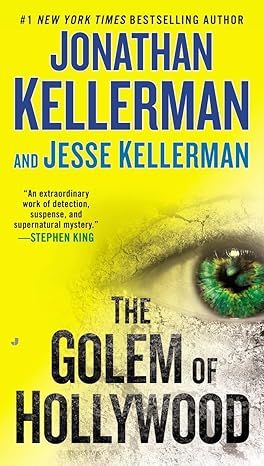
The Golem of Hollywood (A Detective Jacob Lev Novel)
3.3
-
2,513
$2.00

Billy Straight
4.6
-
1,766
$0.50
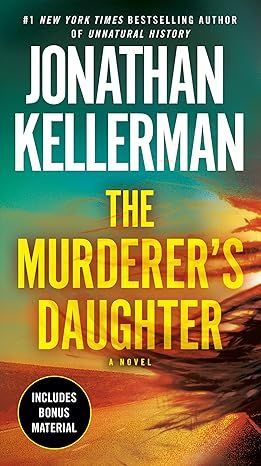
The Murderer's Daughter: A Novel
3.9
-
6,872
$1.74
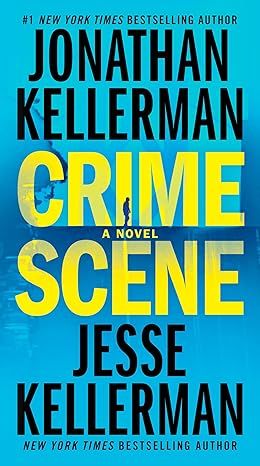
Crime Scene: A Novel (Clay Edison)
4.1
-
5,842
$9.99

When the Bough Breaks (Alex Delaware series, Book 1): A tensely suspenseful psychological crime novel
4.3
-
4,786
$9.99
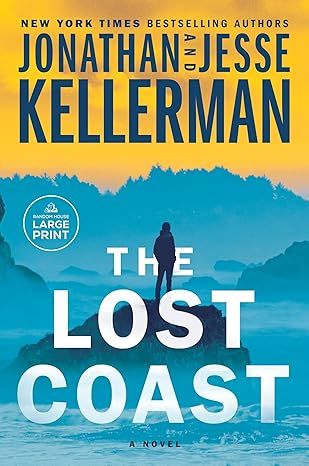
The Lost Coast: A Novel (Clay Edison)
4.4
-
802
$14.99

The Ghost Orchid: An Alex Delaware Novel
4.5
-
9,470
$2.99
Best Sellers
View all
The Tuscan Child
4.2
-
100,022
$8.39

The Thursday Murder Club: A Novel (A Thursday Murder Club Mystery)
4.3
-
155,575
$6.33

Sapiens: A Brief History of Humankind
4.6
-
140,302
$13.49

The Butterfly Garden (The Collector, 1)
4.3
-
88,556
$9.59

Things We Hide from the Light (Knockemout Series, 2)
4.4
-
94,890
$11.66

The Last Thing He Told Me: A Novel
4.3
-
154,085
$2.99

The Perfect Marriage: A Completely Gripping Psychological Suspense
4.3
-
143,196
$9.47

The Coworker
4.1
-
80,003
$13.48

First Lie Wins: A Novel (Random House Large Print)
4.3
-
54,062
$14.99

Mile High (Windy City Series Book 1)
4.4
-
59,745
$16.19

Layla
4.2
-
107,613
$8.99

The Locked Door
4.4
-
94,673
$8.53
